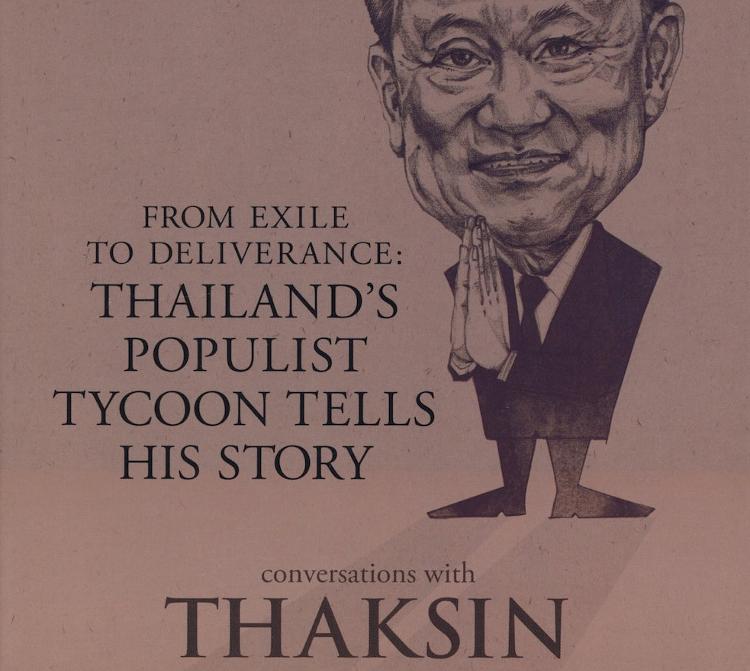
Conversations with Thaksin — From Exile to Deliverance: Thailand’s Populist Tycoon Tells His Story is a collection of interviews with former Thai prime minister Thaksin Shinawatra conducted by Tom Plate. The interviews took place in Dubai, where Thaksin is living in exile, and lasted for over ten hours, thus Thaksin’s life — both political and personal — is covered in considerable depth.
As its title suggests, the interviews are conversations rather than probing interrogations: Thaksin is essentially given a platform to rehabilitate his reputation, and the author rarely challenges his version of events. The title also implies a certain informality, and this is reflected in Plate’s colloquial writing style. Phrases such as “wow, everyone seemingly is in an excellent mood!” feel inappropriate for a political interview.
Astonishingly, Thaksin suggests that he could return to Thailand by royal appointment: “if the monarchy were kind enough to appoint me as an advisor to the Crown Property, I can help Crown Property do better financially.” He adds, “I don’t want to have a Privy Councilor position”, as if such an offer were even remotely possible.
The various controversies of his premiership are reconfigured with Thaksin in the role of victim. He says that the sale of Shin Corp. to Temasek was actually his children’s idea: “My children, they came to me, they said... it might be a good idea for us to sell.” The confiscation of his assets is mentioned only in relation to his decision to sell Manchester City FC: “With assets frozen in Bangkok, I didn’t have enough money to support the club.” Thaksin even uses the notorious Tak Bai incident to elicit personal sympathy: “the tragic and embarrassing incident was part of the plot to topple me”.
Plate sides with Thaksin and his wife over the Ratchada land deal case: “In fact, there was no duplicity. She didn’t hide anything.” He glosses over the thousands of deaths following Thaksin’s drugs crackdown — “Innocent people were being scooped up in the military sweeps” — though devotes multiple pages to softer issues such as Thaksin’s sporting interests and shopping trips.
Even though the book was published in Singapore, material that could contravene Thailand’s lèse-majesté law has been removed. This self-censorship becomes apparent when Thaksin discusses the origins of the 2006 coup: he accuses the Privy Council of orchestrating the coup as a way of “getting me. [content here deleted]”. (The parentheses were added by Plate; Thaksin’s comments are similar to those he made in a Financial Times interview on 20th April 2009.)
Plate is less cautious when it comes to Privy Council head General Prem, referring to “Prem Tinsulanonda, one of the men behind the coup”. (Note the omission of the word ‘allegedly’.) Later, Plate mentions “such an openly gay officer like Prem”. (Rumours of Prem’s homosexuality have not been officially confirmed or acknowledged by the Thai media; Paul Handley’s The King Never Smiles notes that Prem “was so discreet that no one could ever expose his homosexuality”.)
As its title suggests, the interviews are conversations rather than probing interrogations: Thaksin is essentially given a platform to rehabilitate his reputation, and the author rarely challenges his version of events. The title also implies a certain informality, and this is reflected in Plate’s colloquial writing style. Phrases such as “wow, everyone seemingly is in an excellent mood!” feel inappropriate for a political interview.
Astonishingly, Thaksin suggests that he could return to Thailand by royal appointment: “if the monarchy were kind enough to appoint me as an advisor to the Crown Property, I can help Crown Property do better financially.” He adds, “I don’t want to have a Privy Councilor position”, as if such an offer were even remotely possible.
The various controversies of his premiership are reconfigured with Thaksin in the role of victim. He says that the sale of Shin Corp. to Temasek was actually his children’s idea: “My children, they came to me, they said... it might be a good idea for us to sell.” The confiscation of his assets is mentioned only in relation to his decision to sell Manchester City FC: “With assets frozen in Bangkok, I didn’t have enough money to support the club.” Thaksin even uses the notorious Tak Bai incident to elicit personal sympathy: “the tragic and embarrassing incident was part of the plot to topple me”.
Plate sides with Thaksin and his wife over the Ratchada land deal case: “In fact, there was no duplicity. She didn’t hide anything.” He glosses over the thousands of deaths following Thaksin’s drugs crackdown — “Innocent people were being scooped up in the military sweeps” — though devotes multiple pages to softer issues such as Thaksin’s sporting interests and shopping trips.
Even though the book was published in Singapore, material that could contravene Thailand’s lèse-majesté law has been removed. This self-censorship becomes apparent when Thaksin discusses the origins of the 2006 coup: he accuses the Privy Council of orchestrating the coup as a way of “getting me. [content here deleted]”. (The parentheses were added by Plate; Thaksin’s comments are similar to those he made in a Financial Times interview on 20th April 2009.)
Plate is less cautious when it comes to Privy Council head General Prem, referring to “Prem Tinsulanonda, one of the men behind the coup”. (Note the omission of the word ‘allegedly’.) Later, Plate mentions “such an openly gay officer like Prem”. (Rumours of Prem’s homosexuality have not been officially confirmed or acknowledged by the Thai media; Paul Handley’s The King Never Smiles notes that Prem “was so discreet that no one could ever expose his homosexuality”.)

